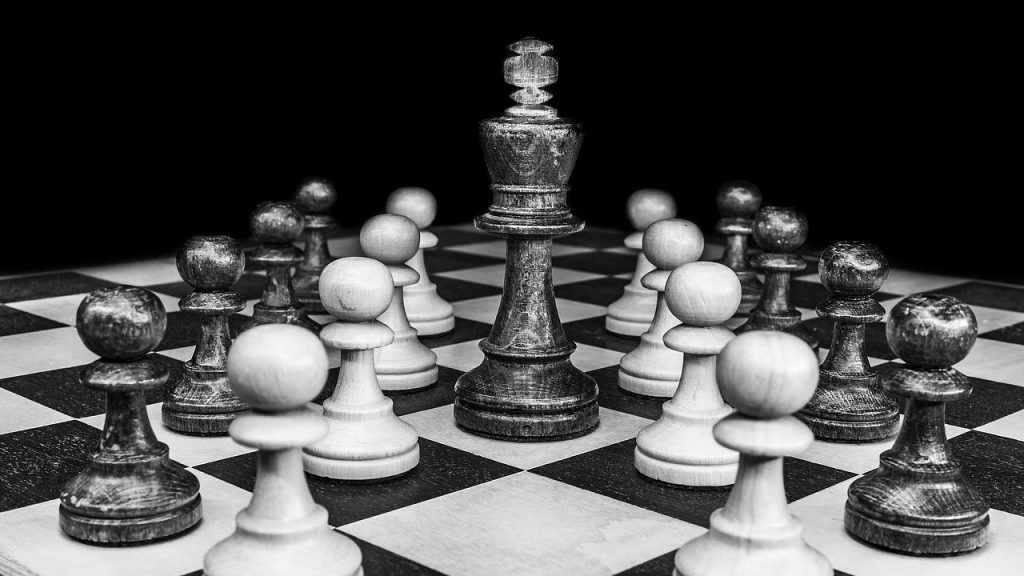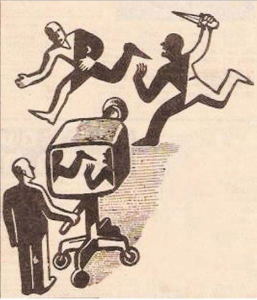News of the Day – Media Spin
July 25th, 2019 // 3:37 pm @ Oliver DeMille

I. Today in the News
There is so much going on in the news these days–big events that have major potential to influence the future of our nation and freedom. Unfortunately, almost all the news is reported with strong partisan leanings. The slant and spin are frequently overwhelming.
To respond, I’ve decided to do an in-the-news series that steps away from current partisan spin and addresses the big news of the day from the perspective of the U.S. Constitution and the viewpoint of the American Founding. It will give readers a different way to look at things. I’ll try to keep these brief and to the point, just a few paragraphs per post. I hope you will comment and share so this can influence people…
II. July 2019: Media Spin
Most people tend to see modern media as two groups warring with each other—the media Left versus media Right—over what’s really going on in America. Whatever politicians do in Washington, the Left media spins it one way, and the Right media either spins it differently or seeks to debunk what the Left media has reported. Most Americans tend to see through this spin, but very few see the “other” part of what’s actually happening.
We live in the age of reality entertainment. Sports, the original reality show, is very popular—especially big events (like the Super Bowl) on live TV. Live politics, such as debates, are popular as well, though not quite as popular as sports. Reality television programs continue to garner and keep avid fans every season.
Perhaps if we really thought about it, we would realize that there is a formula of success for reality television. Extra credit if you realize that it applies to politics every bit as much as it does to shows like The Bachelor, the Super Bowl, Survivor, Keeping Up with the Kardashians, American Idol (and all it’s talent and dance spin-offs), March Madness and the NBA Playoffs, the Real Wives series, The Apprentice, etc.
Survivor – Media Style

Here are the key points in the formula of Reality-TV Success:
- Ratings depend on a battle between two sides
- How strongly people hate one or both of the sides drives ratings, the more intense the hate, the higher the ratings
- To get non-interested people to start watching the show, you need to get regular people talking about the villains they hate on the show (so the uninterested people will hear about the controversy in strong enough terms that a number of them tune in)
- The battle and controversy must escalate each week, to keep people watching
- Viewers must know that a major showdown (a finale) is coming, and that it will portray high drama with a clear winner who takes all the spoils and a loser who is sent home with nothing [in politics, this finale is the next major election]
- Only hated villains increase ratings drastically, so the job of producers and reality-show participants is to exaggerate and dramatize the conflict, over and over, the more the better
- If you want to win, you need to be seen as strong and trying hard but also vulnerable, you need to be attacked and hurt, “bloodied” by your enemies and opponents, but refusing to give in or give up, to the point that many viewers are rooting for you (as much as they are simultaneously wanting the villains to lose, and as much as half the viewers are hating you and seeing you as the villain)
- If you are portrayed as a villain on such a show, the key is to find an even bigger villain, show how they’re hurting you, and create a major conflict between you and them
- Only outlandish, extreme behavior reaches a lot of new viewers and thus boosts ratings, and such behavior must be repeated next week if you want even more new viewers
- Being liked and considered good and classy kills ratings and viewers tune out, only tuning back in when there are bizarre and extreme attacks and controversies [in sports this is often achieved by bad behavior off the field and also by strong team rivalries and hatreds; the same is true for many actors and celebrities whose careers are in decline and they need to find a way back into the news]
- Only when you are strongly attacked will people really listen to you or care about you, and when you fight back effectively (i.e. in extreme ways) you will be admired by some and gain new support
- What happens on screen must be interesting enough that other TV shows and social media posts are inundated by people attacking you, and others defending you, or you aren’t going to win
- The more extreme attackers you can get to “gang up” on you, the more your supporters will line up to vocally defend you, and the more supporters you’ll get over time.
This formula can be weakened a bit by judges on shows where such judges have real power; but on TV shows where the viewers are the only judge, these rules become even stronger.
Now apply all this to politics, which is currently covered by the news media and posts on social media using these same reality-show rules. Add to this the tactic of “baiting”, where one contestant wants to gain more supporters, so he/she attacks another person or group in an extreme way, in order to hopefully elicit an extreme reaction, which will in turn get a lot more supporters for himself/herself.
One reason this tactic is so effective is mentioned above: extreme controversy gets uninterested people to pay attention and take sides, and some of them will join your side.
But wait…some will join the other side too, so how does this actually help you?
Answer: When some new viewers join the other side, and some join your side, you don’t gain much. But when you bait multiple people and groups, incentivizing some to join you and others to join those you attack, you gain support with every controversy, but those joining your enemies typically join ONE person or group you attacked, while not emotionally joining the entire other SIDE.
Specifically, for example, when president Trump baits Nancy Pelosi and then later baits Alexandria Ocasio-Cortez, and then later Joe Biden, and Bernie Sanders, and then CNN, etc., he gains more supporters every time–depending on the level of controversy and intensity of attacks by him and against him. But while each controversy also gains supporters for each of the attacking entities, they aren’t united. Indeed, many who take Pelosi’s side really dislike Alexandria Ocasio-Cortez, and vice versa. Many who take Joe Biden’s side don’t like Bernie Sanders, and vice versa.
In fact, these smaller factions often try to tear down each other as much or even more than they try to denigrate the president. But ALL the new supporters gained by the president in each separate controversy give more to support him. At the same time, this pattern creates the feeling that everyone is ganging up on the president, engendering more sympathy, stronger emotions of support by his base, and more new supporters who dislike that he’s being ganged up on and also new supporters who like the way he stands up, all alone, to the gang that is piling on against him.
See the Whole Board

This is the same formula utilized in most popular high-action movies, viz. Chuck Norris, John Wayne, The Rock, Rocky and Rambo, Arnold Schwarzenegger, Mission Impossible, Bruce Willis, Captains Kirk and Picard, Black Panther, Wonder Woman, James Bond, The Matrix, the Flash, Jason Bourne, Avengers, etc. It’s the same pattern outlined in steps 1-13 above. Superheroes and superheroines stand against all odds, despite personal struggles or individual character flaws, and battle for what they believe in, suffer attacks and are hurt, and keeping fighting anyway, until they eventually win over evil.
Indeed their personal weaknesses, shortcomings, mistakes or character flaws almost always endear them to their supporters, because the “heroes” stand up against the attacking enemies even though they themselves are flawed and far from perfect. Think Iron Man, Sherlock Holmes, or Bruce Wayne.
Ronald Reagan was great at creating this heroic “reality” in the public mind, so was president Obama. JFK impressively did it before “reality shows” were even a thing. Bob Dole and Michael Dukakis were terrible at it, as was John Kerry. Kissinger was good at it, and Al Gore understood it and tried to do it, but couldn’t quite pull it off.
Neither George Bush was very good at it either, nor was Jimmy Carter. Marco Rubio and Bernie Sanders didn’t do it well; Chris Christie is great at it, but not quite as good as Trump. Bill Clinton mastered it, but Hillary struggled—just didn’t quite get it, mainly because she wanted to “be liked” too much.
This appears to be the same reason Jeb Bush, John McCain, and Mitt Romney couldn’t use it very well—the extreme attack, the relentless controversy, the bizarre media battles, and purposely getting half the nation to hate you so the other half would support you, just wasn’t their thing. They wanted everyone to like them. Donald Trump is more interested in winning than being liked, and he is even better at reality-show tactics than Bill Clinton.
Joe Biden tries, but so far isn’t very good at it. But the real issue is whether the American people understand these tactics and recognize when they are being employed. Those who dislike Trump consider such reality-TV tactics lacking in taste, class, and decency, but tend to admire the same tactics when launched by those from their side of the aisle. Trump supporters who understand this tactic generally wink and laugh when the president so effectively employs it against the Left, but they frown when it is used by Nadler, Schiff, Pelosi, Rachel Maddow, Chris Matthews, Stephen Colbert, Robert De Niro, or Alexandria Ocasio-Cortez, among others.
One way to quickly recognize this tactical approach is simple: Whatever tonight’s mainstream news is openly attacking about Donald Trump, go see how he baited it. See what person or group he’s baited, and how the news media is sucked into spreading his plan for their response of “zealous, extreme outrage” far and wide.
The more angry and adamant the news reports, the more effective his tactic. One little group of his opposition grows, but his support grows even more, bit by bit over time. Then watch his approval ratings a week later–both among his base, and overall. The ratings almost always increase a bit after a major controversy where he baits someone and then the mainstream media attacks him.
The more extreme the attack, the more he usually benefits. An important longterm question is: can Alexandria Ocasio-Cortez master these same reality-show tactics? (Think 2020, 2022, and 2024 House and Senate elections; and the 2028 presidential race.) So far, she’s rivaled Trump in this reality-TV-style tactical arena. Some might argue that she’s even better at it.
As for 2020, a salient question is whether Kamala Harris or Elizabeth Warren (or any other candidate) can dominate reality-show tactics more effectively than Trump? Though the election cycle is just beginning, Kamala so far seems very adept with these tactics. Measuring effectiveness according to these tactics, Kamala is right now the clear frontrunner for the Democratic nomination in 2020.
Think Several Moves Ahead

Finally, why do such tactics work? The answer is deeply rooted in human history, perhaps even in our ancestral/emotional DNA. Stories are our deepest language, and stories of the the underdog battling for what’s right, against evil, protecting the little guy against the “dark” forces of might and massive power, especially against all the odds, while being attacked from all sides, are ingrained in our collective experience.
The Left tries to use this same plotline against Trump (the plight of illegal immigrants), while the Right turns it against his opponents (the rising sinister forces of socialism). Each time the president baits anyone on the Left, or even the Right, the mainstream media’s response is so extreme, so howlingly mimicking the voices of an angry mob, that they make him look like the besieged warrior standing alone, refusing to stop believing or fighting for what he thinks is right.
In any plotline from reality TV or movies (or literature), the figure cast in such a role is always the hero. Regardless of the words spoken by the “sides,” year after year, with each night’s news, this narrative remains firm. And it grows each time it is broadcast, reinforced with every new and different situation.
In 2016 Trump inhabited this image, this feeling, more effectively than anyone else. In 2020? We’ll see. But so far the mainstream media is absolutely addicted to repeating this narrative every day, every evening, every newscast. And the president makes sure they keep doing it. It might possibly be that only someone who does it better, whatever their politics, can displace him.
The real issue, as mentioned, is whether or not we as citizens understand this—when it is utilized by Trump, Alexandria Ocasio-Cortez, Bernie Sanders, Kamala Harris, or anyone else on the Left or Right.
It is our job to oversee and guide our nation’s future. We can only do this if we are playing chess, not checkers—clearly seeing through spin from all sides and immediately/consistently recognizing what is bait and what imagery is portrayed in every controversy.
Those playing “checkers” will hear the roar of the mainstream media criticizing a political figure and belief that he/she is on the ropes; those who actually understand what is happening clearly know that such noise communicates the exact opposite.
Category : Blog &Citizenship &Culture &Current Events &Featured &Generations &Government &History &Independents &Information Age &Leadership &Liberty &Politics &Statesmanship &Technology













Nick Quinn
6 years ago
This is so spot on. News has become more of a reality show than most reality shows, and Trump is the master of getting the Left to follow the red dot of the laser pointer he’s holding. I hope your theory is correct that he’s gathering more followers than opposition with these tactics because for all his faults he’s infinitely better for this country than the Leftist extremists running against him in 2020.
Kami
6 years ago
My husband has been saying this about Trump since the beginning. He knows how to play the game it seems. I hope that for the future, though I do know it will take a major awakening, that the public will see the game for what it is, discourage the childish tactics and begin to demand a higher level of conduct for the office and for our representatives.